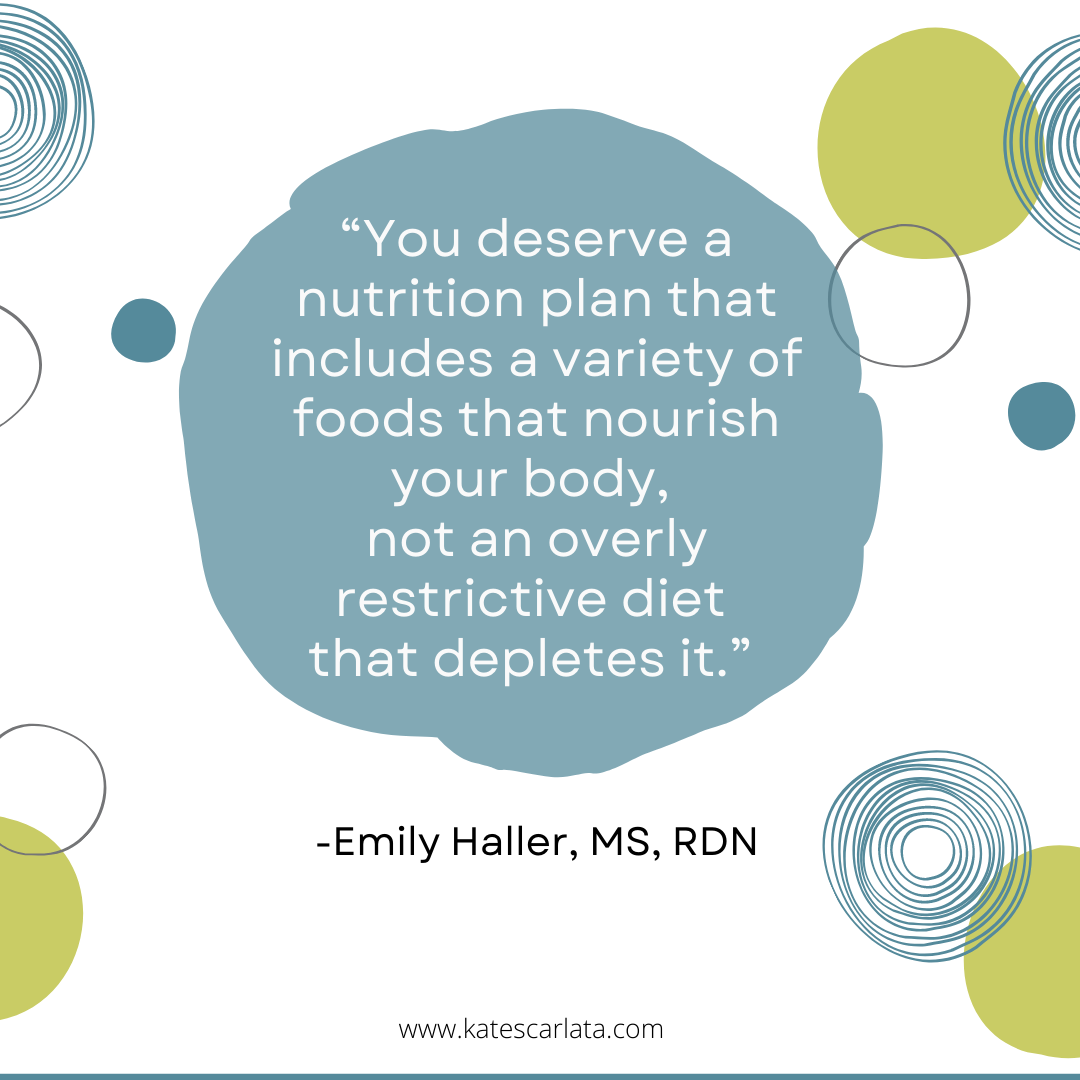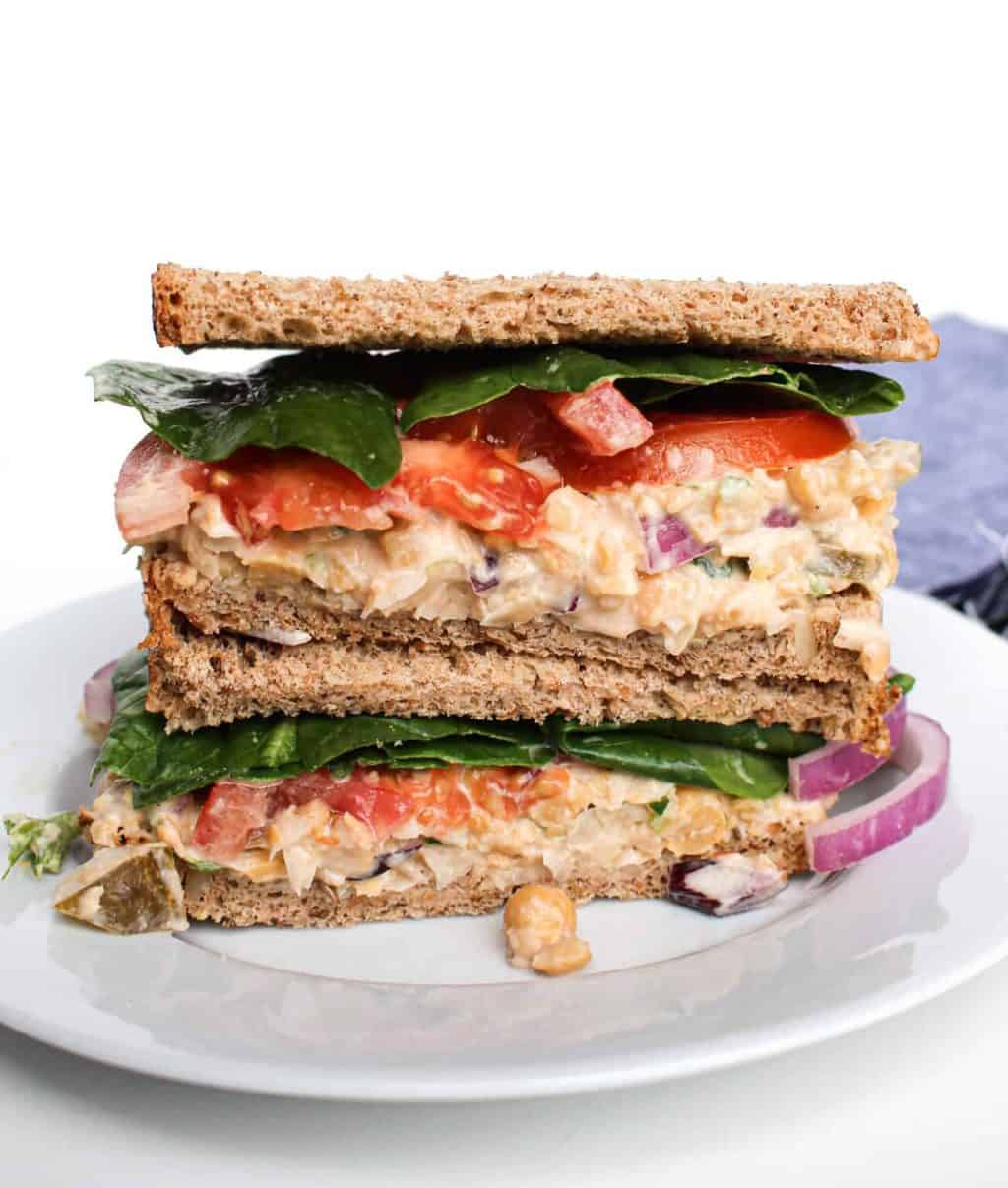Hello Friends, today I would like to introduce my friend, colleague and GI dietitian expert, Emily Haller MS, RDN. Emily and I have worked together on a number of projects including a couple peer-reviewed journal articles together. She’s smart, fun, collaborative and great all around person!
Learn more about Emily and what she does in practice with her own flair, her plant-based eating preferences, her active lifestyle (especially biking!) and her love of planet Earth and all of its animals.
Emily is in the pink!
Kate: Could you share with my audience a bit about the work you do as a GI dietitian?
Emily: I work with the Division of Gastroenterology and Hepatology at Michigan Medicine, University of Michigan Health. I serve as the Lead RD for our gastrointestinal (GI) nutrition program here and I have been working as a specialized GI dietitian for the past 7 years. I absolutely love this area and the work that I do! I also have great interest in plant-based nutrition, climate change and animal welfare.
I specialize in a variety of GI conditions including irritable bowel syndrome (IBS), inflammatory bowel disease (IBD), gastroparesis, celiac disease, gastroesophageal reflux disease (GERD), eosinophilic esophagitis (EoE), sucrase-isomaltase deficiency, and short-bowel syndrome. I provide patient-centered care, so the work I do with patients and the nutrition interventions (education, counseling, Medical Nutrition Therapy) are individualized based on the person, their goals/wants/needs, and condition(s).
In addition to patient care, I serve as a co-director for our GI Nutrition conference: FOOD: The Main Course for Digestive Health. This is a conference for dietitians and other healthcare providers who are practicing, or interested in, caring for patients with digestive disorders.
Prior to the pandemic we were doing cooking demonstration classes in our Food for Life Kitchen, and I cannot wait to get back into this space again. There was an article done on the culinary medicine efforts happening at Michigan and it featured one of our Low FODMAP cooking demonstrations.
You can find me on twitter and IG @emilyhaller_rdn sharing mostly GI and plant-based nutrition info. I also have a website where I create and share delicious plant-based recipes and write on GI and plant-based nutrition topics. I have a recent post on all on dietary fiber which goes along great with the IG live we [Kate + Emily] did for your Digestive Health Series!
I am passionate about helping people with digestive conditions be able to tolerate more plant foods. Eating a plant-rich diet is associated with overall health and wellbeing, and specifically it’s important for digestive health. For example, those with gastroparesis are often advised to eat a low fiber diet, but that doesn’t mean fiber free. There are ways to make fiber-containing foods easier to digest for those with slow gastric emptying. I recently finished an ebook for people with gastroparesis: Eating Fiber Containing Foods with Gastroparesis: A Comprehensive Guide. This is something I have been able to successfully help my patients in my clinic achieve and a topic I frequently receive emails and messages about.
Lastly, I am excited to share about a project we recently started at Michigan which is our ‘Foods to Support Gut Health Series’. This is on Youtube and can be found here.
Kate: I feel like you truly embrace good nutrition and an active lifestyle- can you share a little window into your world?
Emily: Well thank you! I have been vegan for about 9 years and I’m a total foodie. I love cooking, trying new recipes, and sharing good meals with others. My decision to eat vegan aligns with my values which include supporting animal welfare and our climate. Luckily, a plant-based diet also happens to be great for us too! Now I do want to highlight a plant-based diet is a diet consisting mostly or entirely of plant-based foods. Eating a plant-based diet does not mean one must go vegan or vegetarian, but those are two examples of a plant-based dietary pattern. Another example is the Mediterranean diet. A plant-based diet is defined in terms of low frequency of animal food consumption.
A major time saver for me is batching cooking and making great use of leftovers throughout the week. For example, I will batch cook starches like rice, quinoa, potatoes, or pasta that I can use throughout the week. If I am making a soup, chili, tofu scramble, veggie stir fry, or roasting veggies I will always make extra. Cook once, enjoy twice (or more).
In terms of an active lifestyle – I really enjoy spending time outside and the endorphins that come with exercise. It truly makes me a more balanced, happy person. So, most days I try to work in some sort of physical activity into my day whether it is walking, running, or riding my bike. I joined the Ann Arbor Triathlon Club in 2015 and then the Ann Arbor Velo Club in 2018. Finding communities of like-minded people is really the best – you get the social aspect, accountability, support, plus the experience of engaging in physical activity which provides a challenging and rewarding experience. 
Kate: As a leader in the GI nutrition space, can you provide 5 tips you often provide to your patients living with IBS?
Emily: Of course!
- Eat well-balanced meals spread throughout the day and lean on snacks as needed/desired as a bridge between meals. This can help you meet your nutrient needs as well as avoid issues that can come with undereating, grazing all day, going too long without eating, and/or relying on a larger or “main meal” once daily.
- How we eat impacts our digestion. Common questions I ask my patients: Are you eating on the run? While watching TV or on a phone? Would you say you are a fast, moderate, or slow eater? Chewing foods well, and eating in eating in a calm, relaxed state supports digestion and food tolerance.
- Just because something is “good”, more isn’t better. For example, staying hydrated is important, but drinking excessive fluids can contribute to GI symptoms like fullness and bloating. Another example: fiber which is important for digestive health but too much can exacerbate symptoms and for those with IBS, fiber tolerance (both type and amount) is highly individualized.
- You deserve a nutrition plan that includes a variety of foods that nourish your body, not an overly restrictive diet that depletes it. A common goal I find myself helping my patients work towards and achieve, is eating a diet with the most variety while maintaining gut symptom improvement. Increasing confidence and enjoying what you eat while managing IBS symptoms is possible.
- Save your money and avoid food sensitivity testing. The science isn’t there, yet. At this time food sensitivity testing using IgG antibodies to various foods in patients with IBS lacks proper validation in research. Food intolerance is complex and working with a specialized GI dietitian can help you identify triggers. Patients know their body best and until we have a way to reliably test for specific food sensitives, we often do what I call “Trial, Listen, and Learn”. This looks like having a patient try a specific nutrition intervention(s) for a specific period of time, the patient monitors to see what type of relief/change this brings, and we learn from this and continue to adjust if/as needed from there.

Kate: What’s are your fav plant-based proteins?
Emily: Soy curls, firm tofu (so good with homemade stir fry and tofu scramble), lentils, beans, and quinoa.
Specific recipes I love and make often:
- Soy Curls: The Best Vegan ‘Chick’n’ and Potato Soup
- Chickpea: Vegan Chickpea Tuna Salad Sandwich
- Quinoa: Coconut milk breakfast quinoa and Low FODMAP Quinoa Tabbouleh
- Lentils: Smoky Red Lentil Soup with Spinach
- Tempeh: Marinated Peanut Tempeh
Chickpea-based “tuna: Salad Sandwich (yes, you can make this Low FODMAP sans onion!)
Kate: For people living with IBS that want to increase plants in their diet, do you have any tips for success?
Emily: Because we know roughly 50-80% of people with IBS are sensitive to FODMAPs I typically recommend starting with low FODMAP plant-foods but this doesn’t mean high FODMAP plant-foods are off the table! So, for example, adding in low FODMAP whole grains (oats, quinoa, brown rice) and starches (potatoes and sweet potatoes), fruit (raspberries, kiwi, orange, pineapple), and vegetables (carrot, cucumber, spinach, broccoli florets), a handful of suitable nuts, 1-2 tablespoon of a nut butter or and seeds like chia, pumpkin, and flax. Also, firm tofu, tempeh, and 1 cup of edamame are low FODMAP plant-protein options. This is certainly not an exhaustive list, but I think it can be nice to see some specific examples.
With food tolerance and intolerance – portion size matters. Whole-plant foods contain fiber in varying amounts. When increasing daily fiber intake, it is important to gradually increase over time to allow the body and gut microbes to adjust. If we increase fiber intake too quickly that can result in increased gas, bloating and discomfort – GI symptoms those with IBS are often dealing with and trying to improve. Additionally, keep in mind some packaged plant-foods like firm tofu, hemp hearts, almond milk, and creamy nut butters are delicious low fiber options.
Another great option is to cook with more herbs and spices. For example: basil, cinnamon, turmeric, thyme, rosemary, sage, paprika, and parsley. These plant foods make our meals taste delicious and are an excellent source of antioxidants.
One way to help increase variety of plant foods is to commit to trying new recipes or plant-based ingredients over time. For example, this could be once per week or once per month – whatever timeframe feels do-able for you. You can start by picking out a new recipe in a favorite cookbook, look one up online, or pick out a new ingredient in the store and then find a recipe that uses this. Trying new recipes can help you discover new favorite dishes and gain some valuable cooking skills in the process.
Thanks Emily for sharing your incredible tips about plant-based eating, food intolerance + IBS, and more!


